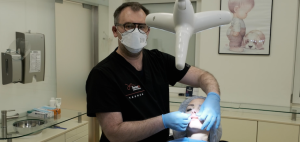
Unlawful charging of doctors for commissioned research
– Doctors cannot be put in a position of potential conflict of interest that can negatively affect patient safety. Charging doctors for the costs of ordered diagnostic tests violates the law and can cause real danger, Bartlomiej Chmielowiec stresses. The position of the Patient Ombudsman was upheld by the Provincial Administrative Court, emphasizing in the judgment that such practices could lead to the erosion of the special relationship of trust that should be maintained between the doctor and the patients entrusting him with their health.
November 2019. Information has emerged indicating that some medical establishments introduce provisions in their contracts with physicians providing for the deduction of remuneration by the costs of tests ordered for patients. As a result, doctors not only lost part of their contractually granted remuneration, but in view of ordering more examinations, some were forced, as reported in the media, to pay a surcharge to the employer for the health services they performed. There has been a threat that doctors, fearing for their earnings, will limit the ordering of tests to patients, despite the need based on medical criteria.
The Patient Ombudsman has received signals about the use of the above billing method in 34 medical facilities. Proceedings were carried out in all the indicated facilities, and in 22 cases the Patient Ombudsman found irregularities, issued decisions recognizing the use of practices that violate the collective rights of patients and ordered their abandonment. Two decisions have been appealed to the Provincial Administrative Court in Warsaw. One complaint was rejected by the court, while the other was dismissed as unfounded.
Solution dangerous for patients
The Patient Ombudsman found that charging doctors for the costs of diagnostic tests ordered for patients, including laboratory tests, is incompatible with the law. – Such organization of the process of providing health services established by a medical institution violates the collective rights of patients to health services corresponding to the requirements of current medical knowledge and provided with due diligence – Bartłomiej Chmielowiec points out.
Medical facilities should not introduce solutions that may negatively affect the quality of services and patient safety. The contractual provisions used may realistically affect therapeutic decisions – some doctors may have a problem ordering all necessary tests for patients.
– The basis of the patient-doctor relationship is trust. Doctors perform a profession of public trust and cannot be put in a situation of potential conflict of interest. The physician's actions should be determined solely by current medical knowledge and the welfare of the patient – adds the Patient Ombudsman.
In the opinion of the Ombudsman for Patients, a reservation in a contract that the costs (even partial) of tests will be borne by the doctor who ordered them goes beyond the freedom of contract formation, regardless of whether the inclusion of such a provision results from the will of the doctor himself.
The court upholds the position of the MPC
One medical institution successfully challenged the decision of the Patient Ombudsman to the Provincial Administrative Court in Warsaw. The court dismissed the complaint, agreeing fully with the position of the Patient Ombudsman (ref. Act VII SA/Wa 2173/20). In its judgment, the court stressed that the legal nature of the activities undertaken by the doctor in carrying out the treatment process and ordering additional diagnostic tests, the performance of which is necessary for proper treatment, makes it necessary to consider that the costs associated with the due performance by the doctor of the contract linking him with the institution, given the nature of these expenses, should not be included in the settlement of the remuneration due to the doctor.
In the justification of the judgment, the court indicates that the solution adopted by the applicant company should be considered flawed due to the possible negative consequences realized in the sphere of patient rights. It also shares the MPC's position regarding the dangers posed by a situation in which a doctor bears part of the cost of diagnostic tests ordered by him or her. – The authority in this regard had legitimate reasons to subject the practice committed by the applicant company to consideration on this level, which refers to the negative perception of the indicated situation by patients. This is because it can undoubtedly cause not only the generation of conflict situations when directly refusing to order diagnostic tests, but also the emergence of uncertainty in patients as to whether the right to diagnostic tests realized in connection with the treatment process was not subject to possible limitation due to their cost – emphasized in the judgment.
– Proper organization of work is the responsibility of the medical institution. In case of further signals about charging doctors for tests ordered for patients, the Patient Ombudsman will immediately eliminate such practices – noted Bartlomiej Chmielowiec, Patient Ombudsman.
With what problems do dentists report to lawyers? – If we talk about patient complaints, we notice that more and more often patients are coming forward not only with objections to the treatment itself, but to the respect of patients' rights, says in an interview with Dentonet mec. Pawel Strzelec, emphasizing the role of medical records in proving a point in the event of a lawsuit.


